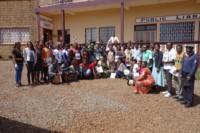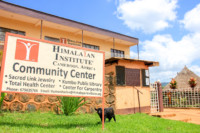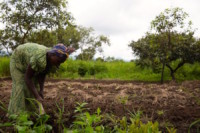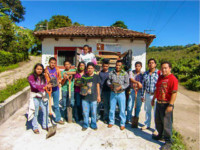For the first time, a Himalayan Institute Energy Farming program has integrated chickens into its organic farming model. They are especially appropriate in Mexico where most families keep chickens. HI Mexico will help families learn how to take full advantage of these valuable animals, who provide eggs, organic manure and pest control on the farm.
HI Mexico’s nine hens and one rooster spend nights in a protected chicken coop and during the day are allowed to free range over the Demonstration Farm. The chickens serve as pest control by eating bugs on the farm while continually helping to fertilize the soil. Their natural inclination to scratch around in the ground provides valuable soil aeration and also mixes in their droppings. The chickens can be restricted with portable fencing to concentrate their activities on a particular field or garden, or to keep them from entering a newly planted area.
While confined in the coop and fenced-in chicken run, the chickens are actually performing a kind of composting! Deep litter composting is a type of low-maintenance composting that occurs where domestic animals, such as chickens and pigs, are confined. It turns the organic matter on the ground, combined with the animals’ manure and bedding, into a compost product that can be used on the farm or garden. The animals do the necessary turning of the compost with their scratching and rooting, and in turn, beneficial microbes in the composting litter support animal health without the need for antibiotics and other drugs.
In addition, each of the hens will lay one egg daily for up to 5 years, providing a small source of income for the center as it works toward financial self-sufficiency. By selecting the local variety of chicken, rather than large farm-produced hens, HI Mexico is helping to contribute to the local economy while demonstrating the full potential of these chickens to other farmers in the area.





